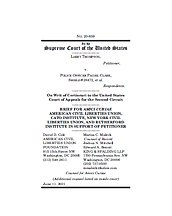Learn more about Cato’s Amicus Briefs Program.
Congress enacted Section 1983 to provide protection to those wronged by misuses of government power. The availability of Section 1983 damages is especially important in the Fourth Amendment context, where no other remedy suffices to protect the full enjoyment of personal security and liberty. Yet in New York and the other states of the Second Circuit, those who are subject to baseless prosecutions that are later dismissed have no remedy when their Fourth Amendment rights are violated.
Larry Thompson and his family were preparing for bed when police officers showed up at his home and demanded entry. When Thompson refused and insisted that the officers needed a warrant, they responded by tackling him, entering his home, and putting him in jail for two days. According to the officers, Thompson’s refusal to let them into his home without a warrant was sufficient basis to arrest and pursue charges for resisting arrest and obstructing governmental administration. Thompson faced criminal prosecution simply because he asserted his constitutional rights.
Shortly after being charged, the prosecutor decided to dismiss the charges. After obtaining dismissal of the charges, Thompson sued the officers under Section 1983, alleging that they violated his Fourth Amendment rights through warrantless entry of his home and a malicious prosecution claim.
The district court ruled in favor of the officers explaining that under Second Circuit precedent, Thompson had to show that the underlying criminal proceeding ended in a manner that affirmatively indicated his innocence. Because the prosecution nor the criminal court provided any specific reasons on the record for the dismissal, the district court found that Thompson did not meet the indications-of-innocence standard. The Second Circuit affirmed in a summary order. Thompson petitioned the Supreme Court to hear his case, and the Court agreed to hear it.
Joined by three other organizations, Cato has filed a brief arguing that the Second Circuit’s indications-of-innocence rule deprives victims of government overreach without avenues of meaningful relief. First, the rule eviscerates the intent of Congress in enacting Section 1983 by erecting an almost insurmountable barrier to vindicating Fourth Amendment rights. Second, the rule allows the government to evade accountability by having the prosecutor dismiss the charges before any indications-of-innocence can appear in the record. Finally, the rule forces the falsely accused to act contrary to their liberty interests if they wish to preserve the damages remedy. Because dismissals of charges do not indicate innocence, an accused must object to the dismissal to preserve the Section 1983 damages remedy.
Although the prosecutor eventually dismissed the charges against him, Thompson still suffered significant harm as he was jailed, missed work, and denied a job opportunity. The Court should reverse the Second Circuit’s decision so that Thompson can seek an appropriate remedy for the violation of his Fourth Amendment rights.

This work is licensed under a Creative Commons Attribution-NonCommercial-ShareAlike 4.0 International License.


